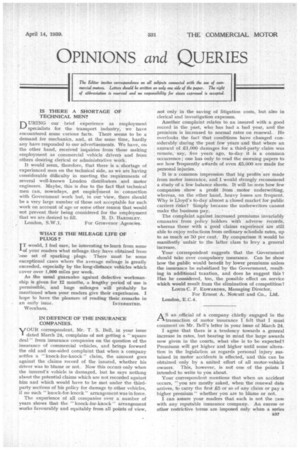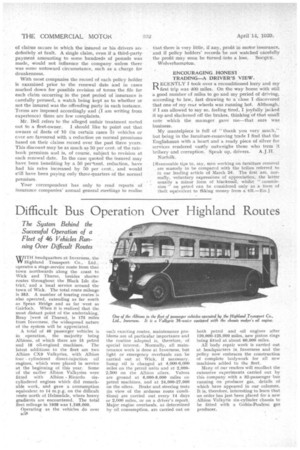OPINIONS and QUERIES The Editor invites correspondence on all subjects
Page 47

Page 48

If you've noticed an error in this article please click here to report it so we can fix it.
connected with the use of commercial motors. Letters should be written on only one side of the paper. The right of abbreviation is reserved and no responsibility for views expressed is accepted.
IS THERE A SHORTAGE OF TECHNICAL MEN?
DURING our brief experience as employment specialists for the transport industry, we have encountered some curious facts. There seems to be a demand for mechanics, and, at the same time, hardly any have responded to our advertisements. We have, on the other hand, received inquiries from those seeking employment as commercial vehicle drivers and from others desiring clerical or administrative work.
It would seem, therefore, that there is a shortage of experienced men on the technical side, as we are having considerable difficulty in meeting the requirements of several well-known London distributors and motor engineers. Maybe, this is due to the fact that technical men can, nowadays, get ernp1o3rment in connection with Government work but, in our view, there should be a very large number of those not acceptable for such work on account of age or some other reason that would not prevent their being considered for the employment that we are desired to fill. R. D. BARDSLEY.
London, S.W.1. For Grosvenor Agencies.
WHAT IS THE MILEAGE LIFE OF PLUGS?
IT would, I feel sure, be interesting to■ learn from some I of your readers what mileage they have obtained from one set of sparking plugs. There must be some exceptional cases where the average mileage is greatly exceeded, especially by the long-distance vehicles which cover over 1,000 miles per week.
As the usual guarantee against defective workmanship is given for 12 months, a lengthy period of use is permissible, and huge mileages will probably be mentioned when your readers give their experiences. I hope to have the pleasure of reading their remarks in an early issue. INTERESTED. Wrexham.
IN DEFENCE OF THE INSURANCE COMPANIES.
V OUR correspondent, Mr. T. S. Bell, in your issue I dated March 24, complains of not getting a "square deal" from insurance companies on the question of the insurance of commercial vehicles, and brings forward the old and one-sided complaint that when a company settles a " knock-for-knock " claim, the amount goes against the claims record of the insured, whether his driver was to blame or not. Now this occurs only when the insured's vehicle is damaged, but he says nothing about the potential claims which are not recorded against him and which would have to be met under the thirdparty sections of his policy for damage to other vehicles, if no such " knock-for-knock " arrangement was in force.
The experience of all companies over a number of years shows that the " knock-for-knock " arrangement works favourably and equitably from all points of view, not only in the saving of litigation costs, but also in clerical and investigation expenses.
Another complaint relates to an insured with a good record in the past, who has had a bad year, and the premium is increased to normal rates on renewal. He overlooks the fact that conditions have changed considerably during the past few years and that where an amount of £1,000 damages for a third-party claim was remote, say, five years ago, to-day it is a common occurrence; one has only to read the morning papers to see how frequently awards of even £5,000 are made for personal injuries.
It is a common impression that big profits are made from motor insurance, and I would strongly recommend a study of a few balance sheets. It will be seen how few companies show a profit from motor underwriting, whereas, on the other hand, heavy losses are frequent. Why is Lloyd's to-day almost a closed market for public carriers risks? Simply because the underwriters cannot make the business pay.
The complaint against increased premiums invariably emanates from policy holders with adverse records, whereas those with a good claims experience are still able to enjoy reductions from ordinary schedule rates, up to as much as 50 per cent. By comparison it would be manifestly unfair to the latter class to levy a general increase.
Your correspondent suggests that the Government should take over compulsory insurance. Can he show how the public would benefit by lower premiums unless the insurance be subsidized by the Government, resulting in additional taxation, and does he suggest this ? Has he considered, too, the possible effect on service which would result from the elimination of competition?
Louis C. F. EDWARDES, Managing Director, For Ernest A. Notcutt and Co., Ltd. London,. E .0 .4.
AS an official of a company chiefly engaged in the transaction of motor insurance I felt that I must comment on Mr. Bell's letter in your issue of March 24.
I agree that there is a tendency towards a general increase in rates, but bearing in mind the large awards now given in the courts, what else is to be expected? Premiums will get higher and higher until some alteration in the legislation as regards personal injury sustained in motor accidents is effected, and this can be obtained only by a united effort of all motor-vehicle owners, This, however, is not one of the points I intended to write to you about.
Your correspondent mentions that when an accident occurs, "you are mostly asked, when the renewal date arrives, to carry the first £5 or so of any claim or pay a higher premium" whether you are to blame or not.
I can assure your readers that such is not the ease with any reputable insurance company. An excess or other restrictive terms are imposed only when a series B37 of claims occurs in which the insured or his drivers arc definitely at fault. A single claim, even if a third-party payment amounting to some hundreds of pounds was made, would not influence the company unless there was some untoward circumstance, such as a charge for drunkenness.
With most companies the record of each policy holder is examined prior to the renewal date and in cases marked down• for possible revision of terms the file for each claim occurring in the past period of insurance is carefully perused, a watch being kept as to whether or not the insured was the offending party in each instance. Terms are imposed accordingly and (I am writing from experience) there are few complaints.
Mr. Hell refers to the alleged unfair treatment meted
out to a fleet-owner. I should like to point out that owners of fleets of 10 (in certain cases 5) vehicles or over are favoured with a reduction on normal premiums based on their claims record over the past three years. This discount may be as much as 50 per cent. of the ratebook premium and is, of course, subject to revision at each renewal date. In the case quoted the insured may have been benefiting by a 50 per-cent. reduction, have had his rates increased by 50 per cent., and would still have been paying only three-quarters of the normal premium.
Your correspondent has only to read reports of insurance companies' annual general meetings to realise
that there is very little, if any, profit in motor insurance, and if policy holders' records be not watched carefully the profit may soon be turned into a loss, SocQuE. Wolverhan-mton.
ENCOURAGING HONES1 TRADING—A DRIVER'S VIEW.
RECENTLY I took over a reconditioned lorry and my i‘first trip was 400 miles. On the way home with still a good number cf miles to go and my period of driving, according to law, fast drawing to a close I discovered that one of my rear wheels was running hot. Although; if I am allowed to say so. feeling tired, I joyfully jacked it up and slackened off the brakes, thinking of that small note which the manager gave me—that sure was business.
My mantelpiece is full of "thank you very much," but being in the furniture-removing trade I find that the Englishman with a heart and a ready piece of silver for services rendered vastly outweighs those who term it bribery and corruption. Speak up, drivers. A.J.H. Norfolk.
(Reasonable tips to, say, men working on furniture removal . are scarcely to be compared with the bribes referred to in our leading article of March 24. The first are, normally, voluntary expressions of appreciation, the latter usually a minor form of blackmail, whilst " commission " on petrol can be considered only as a form of theft equivalent to sking money from a till.—En.]




















































































